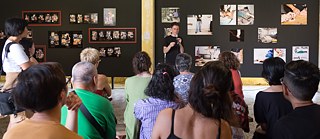Obscura Festival of Photography 2019 in Malaysia
Granting Space in a Polarised World

The Goethe-Institut Malaysia supports two German artists at this year’s OBSCURA Festival of Photography in George Town, Penang. Simon Menner’s collection of East German surveillance photos and Hannes Wiedemann’s photographs of US bodyhackers are geocentric at first glance. Parked under the theme of Subculture at a Southeast Asian festival, discussions around the works change at OBSCURA.
By Adeline Chua
Curating subcultures
Festival director Vignes Balasingam says he chose the theme of Subculture because it was a timely discussion point in an increasingly polarised society. The right to space is as important as the necessity to grant space to others in a world where thoughts, choices, and needs are being policed by the government, the media, and society itself.The exhibition of works features zoophilia, psychics, black American cowboys, and female fight clubs amongst other subjects. The works look into other worlds, allowing viewers a chance to understand that value systems change across places, cultures, and demographics. The curatorial vision, Vignes states, is to bring works made individually together, to speak with and even contradict each other; showing that although people might “share the same ruler, they measure things differently”.
The act of doing something different
Wiedemann’s work is used on OBSCURA Festival’s promotional poster, drawing the attention it calls for. The photo shows a chipped device being inserted into an arm, bulging painfully out from under the skin.Wiedemann says that his photographs of the American Grinders, a community aspiring towards transhumanism by embedding technology into their bodies, attract differing reactions as it tours the world. His home country tends to take a more cautious stand against the invasiveness of technology, while just across the border, the Dutch tend to see more potential than danger in these advancements.

In discussing the project, there is a definite tension in labelling – what is capitalist, what is socialist. A socialist in America is different from one in Germany, taking into account its political history. And as Wiedemann’s work is exhibited in Malaysia, the work is seen through yet another lens and this is when the artist talk is ever more important as it plays its role in unpacking the layers beyond the sensationalism of that promotional poster shot.
Recontextualising East Germany’s past
Simon Menner doesn’t know why he’s still referred to as a photographer. He has been a rummager of archival and media images of late, picking out the absurd amidst the serious. For OBSCURA Festival this year, his selection bears the task of translating the heft of his work’s message to an audience far removed from East Germany’s past. In the tropical heat of the Hin Bus Depot gallery in Penang, the OBSCURA Festival curatorial team have laid out his work like instructional film strips on the wall, tracking Stasi spies’ movements as they document their own training – of how to put on disguises or how to engage in body combat.

The discussion steers towards the effects of being watched, a sentiment that resounds strongly in this region where freedom of speech is still a highly contested right. Although separated by geography and time, Menner’s work on the Stasi still brings up conversations about how authorities create a self-regulating and self-censoring society by subjecting it to a low but constant state of questioning – are we being watched?